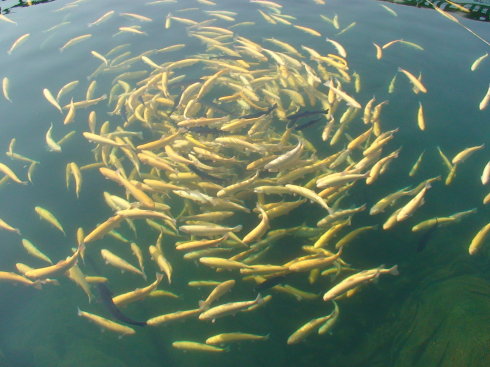(单词翻译:单击)
听力文本
This is Scientific American — 60-Second Science. I'm Emily Schwing.
Half of all fish people eat worldwide now come from fish farms. So farms need to do more to keep up with demand.
"If we look to the future, at today's per capita fish intake around the world we would need to double aquaculture production."
Ron Hardy is the University of Idaho's Director of Aquaculture Research. He presented his research at the recent International Symposium on Fish Nutrition and Feeding in Sun Valley, Idaho, which he also chaired.
In the wild, rainbow trout eat insects and other, smaller fish. But Hardy says there aren't enough little fish to feed larger fish in the wild and still meet market demand as the human population increases. So he's used selective breeding to create strains of farmed fish that get by on food that's less expensive than little fish—feed made from soybeans, corn and wheat.

Some of the farmed fish really thrive: 16 years ago, Hardy had to wait a year for a one-pound trout. These days, his efforts yield trout up to four times as large in the same amount of time.
"So, it would be kind of like if you were going to breed dogs. So we've got everything from Rottweilers to little Scotties or whatever."
But the farmed fish are not completely vegetarian.
"Soybeans don't have skeletons, they don't have bones and the bones in fish meal are a major source of minerals for the fish, for example."
And much like humans, fish diets require omega-3 fatty acids, not found in terrestrial plants. So Hardy has to add a little fish-oil back into the plant-based feed. For those of us without waders, this kind of aquaculture is our best shot at a fish fry.
Thanks for listening the Scientific American — 60-Second Science Science. I'm Emily Schwing.
参考译文
这里是科学美国人——60秒科学。我是埃米莉·施温。
现在全世界人们食用的鱼中,有一半来自养鱼场。所以,养鱼场要做更多来满足人们的需求。
“如果我们放眼未来,以目前世界人均鱼类摄入量来看,我们需要加倍水产养殖。”
罗恩·哈迪是爱达荷大学水产养殖研究所所长。他主持了近期在爱达荷州太阳谷举行的世界鱼类营养与饲料学术研讨会,并发表了他的研究成果。
在野生环境中,虹鳟鱼以昆虫和其它小型鱼类为食。但是哈迪表示,由于人类人口不断增长,野生环境中没有足够的小型鱼类既供大型鱼类食用,又满足市场需求。所以,他采用选择育种的方法培育出几种养殖鱼品种,这些品种依靠花费少于小型鱼类的食物生存,比如大豆、玉米和小麦等。
一些养殖鱼茁壮成长:16年以前,哈迪想得到一只一磅重的鳟鱼,必须要等一年的时间。而现在,他的努力使鳟鱼的产量在同样的时间内翻了四倍。
“所以,这就像培育狗一样。我们可以得到罗德维拉犬,也可以得到小型Scotties犬。”
但是养殖鱼并不是完全的素食鱼。
“大豆中不含骨骼,不含骨头,而骨头是鱼类饮食中矿物质的主要来源。”
与人类很像,鱼饲料也需要欧米伽-3脂肪酸,但它并不存在于陆生植物中。所以哈迪必须要在植物性饲料中加一些鱼油。对于我们这种没有钓鱼用连靴裤的人来说,这种水产养殖是我们能享用到炸鱼的最佳选择。
谢谢大家收听科学美国人——60秒科学。我是埃米莉·施温。
译文为可可英语翻译,未经授权请勿转载!
重点讲解
重点讲解:
1. keep up with 跟上(变化等);跟上(活儿、人等);
例句:Penny tended to work through her lunch hour in an effort to keep up with her work.
为了把活儿干完,彭妮常常午饭时间也要工作。
2. look to 展望,思考(将来发生的事);
例句:Looking to the future, though, we asked him what the prospects are for a vaccine to prevent infection in the first place.
不过,展望未来,我们问到他研制出防止感染的疫苗究竟有多大的可能性。
3. get by 勉强过活;勉强应付;
例句:He gets by on very little money.
他靠著很少的钱过日子。


